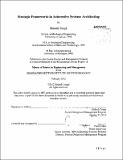Strategic frameworks in automotive systems architecting
Author(s)
Tampi, Mahesh
DownloadFull printable version (3.710Mb)
Other Contributors
System Design and Management Program.
Advisor
Patrick Hale.
Terms of use
Metadata
Show full item recordAbstract
More often than not, large-scale engineering concepts such as those used by creative automotive manufacturing companies require the incorporation of significant capital outlays and resources for the purposes of implementation and production of additional configurations. In most cases, these systems are employed in conditions that are in a constant state of change with regards to the extenuating macroeconomic conditions, market conventions, and customer demands and expectations, requiring a constant inspection of both the performance and quality of the components of the system. With rising fuel prices and a constantly changing global landscape, unique strategies have to be developed and used to create value for the stakeholders by taking into account the aesthetic appeal of the vehicles, their performance, fuel efficiency, and future technological enhancements, while minimizing manufacturing cost and time to delivery. For example, engine selection has a significant impact not only on the design architecture of the vehicle but also on the service infrastructure offered in society. Although strategic management principles hinge on the conventions of maximizing the expected value of uncertainties, flexibility in the architectural design of a large scale complex systems along with its current and future applications have to be taken into account in order to allow the developed systems to not only encompass the theoretical frameworks of conventional engineering but also metamorphose the theories and constructs of modem physics to deliver successful products in conditions characterized by constant geopolitical- social change and increasing global competition. The intent of this research is demonstrate that innovation and better strategic management of automotive designs and its implementation within the construct of the market environment will not only determine the success of the products offered in the short term but also lay the foundation for the long term growth of the enterprise through modular enhancements and serviceability opportunities.
Description
Thesis (S.M. in Engineering and Management)--Massachusetts Institute of Technology, Engineering Systems Division, System Design and Management Program, 2012. Cataloged from PDF version of thesis. Includes bibliographical references (p. 59-60).
Date issued
2012Department
System Design and Management Program.; Massachusetts Institute of Technology. Engineering Systems DivisionPublisher
Massachusetts Institute of Technology
Keywords
Engineering Systems Division., System Design and Management Program.